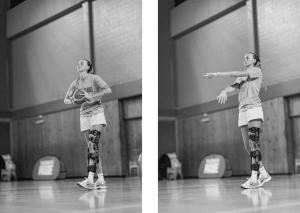Grace George
When The Game Stops; Life Beyond The Court
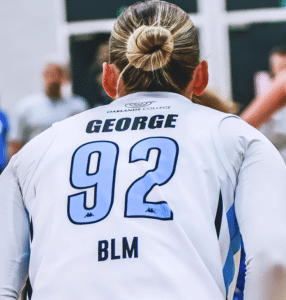
Grace George is a basketball athlete who a little over 18 months ago sustained a horrific life changing injury during a game of basketball which has left her fighting an ongoing battle with surgeries, rehab and a number of mental challenges along the way.
Learn more about Grace’s story below:
Synopsis
Basketball has been a part of my life since I was 10, and now, at 24, I’m navigating an injury that nearly ended my career.
The game has taken me around the world, offering experiences and opportunities I never imagined. What first drew me to basketball was the joy it brought me.
Growing up, it became my escape, a place where I could focus solely on the game, be part of a team, and forget about everything else.
It was simple, it was fun, and it gave me a sense of belonging.
The journey hasn’t been without its challenges.
Over the years, I’ve faced numerous injuries that sidelined me and prevented me from reaching many of the major milestones I had worked so hard for.
Each time, I had to work harder to get back on the court.
Basketball has not only shaped my character, teaching me dedication and perseverance, but it’s also given me a sense of purpose and belonging.
It’s been a constant in my life, a place where I always knew I had a role and a reason to keep pushing forward.
Now, as I continue to recover, I’m reminded that the lessons I’ve learned through basketball, about overcoming obstacles and staying focused will continue to guide me, no matter what comes next…
The Moment Everything Changed
In June 2023, during an NBL1 game, I was on a fast break, my opponent clipped the back of my heel and I ended up tripping.
The result was a closed anterior tibiofibular dislocation, which caused severe damage to my knee. I ruptured all four major ligaments, ACL, MCL, LCL, and PCL, along with significant soft tissue tears and fractures.
In the process, I completely squashed my popliteal artery, the crucial vessel that supplies blood to my lower leg. Without the blood flow to that area, the situation became far more complicated and urgent.
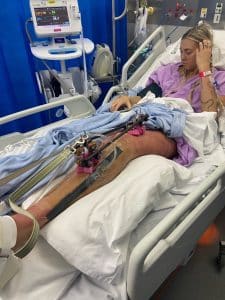
What do you remember from the moments after the initial shock from your injury?
After the initial shock, things are a little hazy because I was heavily medicated, but I do remember some key moments. My first thought when it happened was, Why is my leg facing that way and why does it hurt so bad. I was really scared, scared I wouldn’t be able to play again and unsure of what was going to happen next.
I remember being told that the situation was life or limb, and it didn’t feel real. I couldn’t believe it was happening, it was the worst day of my whole life but I just knew that I had to fight.
Being in the hospital for an extended period, I had a lot of tough conversations. They weren’t sure if the graft vein they used to save my leg would survive, and I was told I might never walk normally, let alone play basketball again. The pain was constant, 11/10, and honestly, I just kept thinking, What is going on? How am I going to get through this?
It was a lot to process and I was unable to do so for a very long time.
How important was the medical attention you received? Why?
The immediate medical attention I received after the injury was crucial, especially because I didn’t have blood flow to my lower leg for nearly two hours.
The lack of circulation meant that tissues in my leg were dying, which could have resulted in the loss of my leg.
The medical team at the PA in Brisbane performed a life-saving vascular bypass. This procedure was essential because without it my leg would have been amputated.
This intervention, along with the other treatments I received, were key in preventing further complications and giving me the best chance at recovery.
Without all the medical attention the outcome could have been much more devastating, not just for my basketball career but for my life.
How many surgeries have you had so far?
So far I’ve undergone 5 surgeries for this injury with my sixth one around the corner.
What has the recovery process looked like to date?
The recovery process has been a multi-phase journey, starting with three vascular surgeries and two orthopedic surgeries.
After each procedure, I had to focus on regaining mobility and strength.
One of the biggest challenges was relearning how to walk again, which involved intense physical therapy. I also had to work on regaining my range of motion, which took time and consistent effort.
After that, I progressed to more functional activities, like riding a bike and building strength where I had lost it. The process has been gradual but disciplined.
Beneath The Surface; The Emotional Battle
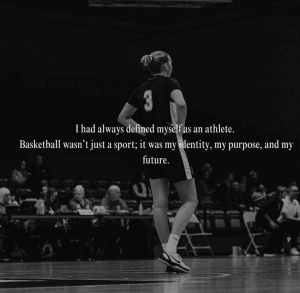
Throughout this journey, what challenges have you faced?
Throughout this journey, I’ve faced numerous challenges, both physical and mental. There have been plenty of highs and just as many lows.
There were moments of progress where I’d feel like I was making decent strides, gaining strength, regaining mobility etc. But then, just as quickly, I’d hit a setback.
Those moments were frustrating and disheartening.
The hardest part has probably been the plateaus. After the early progress, I’d reach points where it felt like I wasn’t getting any better, no matter how hard I worked. Those moments of stagnation really tested me. It felt like I was stuck in a place where progress was just out of reach, and it was mentally exhausting.
The mental side of recovery has been even more challenging than the physical, with the constant uncertainty. But through all the setbacks and plateaus, I’ve learned to celebrate the small wins.
I’ve learned to trust the process and keep pushing forward, even when things seem to stall.
Have you experienced any emotional battles with yourself?
Along with the physical challenges, there were also some very tough emotional battles I faced and am still facing. Dealing with body image issues.
My body didn’t feel like my own anymore. I felt disconnected from it, and it was hard to see myself in the same way I did before.
This led to feelings of having no purpose, because my body wasn’t functioning the way it used to or the way I wanted it to and I wasn’t able to do the things that had previously defined me.
There were a lot of moments where I felt lonely and isolated in my struggles, especially when I couldn’t physically be where I wanted to be, I didn’t enjoy life anymore.
I went through periods of feeling hopeless, wondering if I’d ever fully recover and trying to process that I won’t be the same player/ person I was before.
Everyday brings different emotions, good & bad.
What coping mechanisms have you found to work?
The best coping method I found was to take things day by day.
When I focused on being present in the moment, it really helped me avoid the overwhelm that came from thinking too far ahead.
That sense of uncertainty could quickly spiral into anxiety, so focusing on what I could control in that moment helped.
I also made a conscious effort to be positive wherever I could. I found that negativity only added to the frustration and didn’t change the reality of my situation.
Staying positive helped me mentally and emotionally, and it also had a positive effect on those around me. I chose to focus on what I could do to move forward with a better mindset.
A big part of my recovery was also relying on my support network. Knowing I had family, friends, and healthcare professionals who I could trust made a huge difference in my peace of mind.
Building those connections with the professionals I was working with, especially those who were physically working on or operating on my leg, gave me confidence in the process and alleviated a lot of anxiety.
Another thing that helped was documenting my recovery journey. Posting about my progress not only gave me a chance to reflect on how far I’d come, but it also allowed me to receive support from others who were following along.
Strength In Numbers; Your Circle of Support
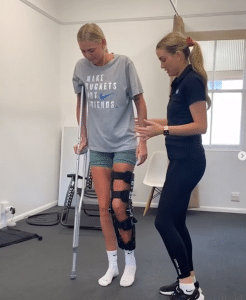
Who has played a major role during your journey? How/Why?
Throughout my journey, there have been so many people who have played massive roles in supporting me, and I wish I could name everyone. My surgeons, they saved my leg/life and everything they have done that came after the initial emergency surgery.
Georgia Ralph, my physio, teammate, and forever friend, has been with me from the very first moment, providing comfort and making crucial decisions that ultimately saved my life. Since then, she has been a constant in my recovery, both physically and mentally, and her dedication has been a major factor in my healing process. Shoutout to Jason as well for also providing so much support alongside Georgia.
Mum, who has been by my side through everything. She put her life on hold to make sure I was okay, taking time off work, supporting me emotionally, and doing everything she could to ensure I could keep moving forward. The things she’s done for me, especially just helping me get out of bed every day, are beyond words. I truly don’t think I can thank her enough.
Of course, I couldn’t leave out the unwavering support from my family and close friends.To everyone who’s been part of this journey, whether named here or not, you know who you are, and I am beyond grateful for everything you’ve done. Your support has made all the difference, and I’ll never forget it.
How important is it to have a support network around you?
Having a strong support network has been essential. The people I’ve had around me have helped keep me grounded, motivated, and accountable, making it all that little bit easier to deal with.
Personally, a support network also creates a sense of security, knowing you have people who’ve got your back. It improved my mental health, reduced stress, and so much more. Ultimately, it’s the foundation that allows me to thrive, not just survive.
Beyond The Court; Personal Growth
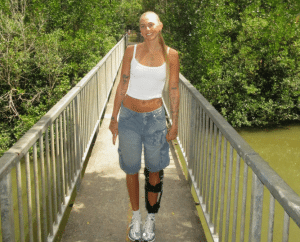
What life lessons have you discovered from your injury?
From my injury, I’ve learned that life can change in an instant.
It’s shown me the importance of doing what makes me happy, surrounding myself with people who make me feel seen and loved, and approaching life with intention because we never know what tomorrow will bring.
I’ve discovered strengths and resilience in myself that I didn’t know existed, and it’s given me a much more positive outlook on life.
What’s one thing you have learnt to appreciate, that you might have previously taken for granted?
One of the biggest things I’ve come to appreciate is my body.
I’ve gained a deep respect for everything it has endured and how capable it is, even when it’s not 100% where I want it to be. I used to take that for granted, often focusing on how I looked or what I couldn’t do.
Now, I realize how lucky I am to have a body that works and pushes through challenges. I’m incredibly grateful for what I can do, because for some, it’s a dream to even have that ability.
How much do you miss playing the game of basketball?
I can’t really put into words how much I miss being able to play. Basketball is something I genuinely love, and I know nothing could ever replace it.
While it’s true that basketball brought me my worst day, it’s also given me the majority of my best days.
The happiness and fulfillment I felt on the court far outweighs the pain of the accident, and that’s something I’ll always carry with me.
Getting back on the court has been my driving force through rehab, it’s what motivates me every single day.
I know some people might think I’m crazy for wanting to play again after what happened, but it just makes sense to me.
It’s all I want to do, and nothing else could replace the passion and drive I feel when I think about being back out there.
More Than a Game; A Lasting Impact
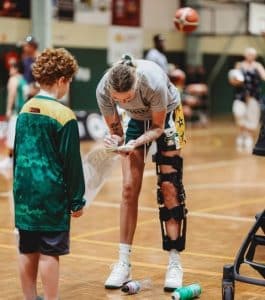
What lasting impact would you like your story to have on others?
I hope my story shows others that setbacks don’t define us, they’re part of life.
Resilience can be found even in the hardest times, and growth often comes from the challenges we face.
I hope my story encourages current athletes to feel grateful for what they have and where they are, and inspires kids to take up basketball or any sport.
Sport has the power to carry you through the darkest moments.
Do you have any advice for athletes who might be struggling with injury or setbacks?
To athletes struggling with injury or setbacks, my advice is to stay patient and trust the process.
Progress may feel slow, but every step counts.
Surround yourself with support, and use your struggles as fuel to keep going.
It’s okay to grieve what you’ve lost, but don’t lose sight of your love for the game or your goals.
Keep believing in yourself and you’ll get through it.
How you feel during those times, won’t last forever.
If you could speak to a younger version of yourself, what would you say?
If I could speak to a younger version of myself, there is so much I could say but at the forefront of my mind is just to tell little grace that it is going to be okay, even when it doesn’t seem like it. And if I have one thing, always have hope.
The Next Chapter; Future Grace
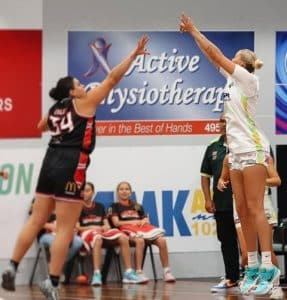
Outside of a career in basketball, what do you see yourself doing?
Right now, I can’t really imagine doing anything other than basketball.
I’m still processing all the emotions that come with that, but what I do know is that I want to use my experiences to help others.
I’m not exactly sure what that looks like yet, but it’s definitely a goal of mine to take what I’ve experienced and learned, and share it in a way that can make a positive impact on those around me.
Can we expect to see Grace George back on a basketball court any time soon?
I believe I can get back on the court, and I’m hopeful that it will be in the near future.
However, there are still a lot of unknowns, and I’m realistically still a long way off from that end goal. But I’m determined, and one day, I know I’ll be back out there.
What are you most excited about in the near future?
I’m really excited about the progress I’m making in my recovery journey, reaching little goals and being able to create new ones and getting closer to the steps I need to take to improve.
I’m also excited to keep facing this challenge with a positive perspective, learn more about myself, build connections through this process and hopefully new opportunities.
Epilogue
The story of Grace George is one of resilience, hope, and the unyielding spirit of an athlete determined to rewrite her narrative. While the injury that threatened her basketball career will forever remain a part of her journey, it does not define her. It has instead become the catalyst for a deeper understanding of herself, her purpose, and her capacity for growth.
Grace’s recovery continues, marked by small victories that collectively build toward a future she is determined to reclaim. While the road back to the court is long and uncertain, Grace’s unwavering belief in herself and her love for the game fuel her journey. She remains a symbol of strength, not just for athletes facing similar challenges but for anyone navigating adversity.
Off the court, Grace is finding new ways to channel her experiences into helping others. Through sharing her story, she’s creating a legacy of inspiration, encouraging those who hear it to embrace resilience, find gratitude in their own journeys, and believe in their ability to overcome.
For Grace, basketball is more than just a game—it’s a lifelong passion that has shaped her character and guided her path. Whether on the hardwood or beyond, Grace George continues to embody the very essence of perseverance and purpose, proving that life’s setbacks can be transformed into comebacks.
Her next chapter remains unwritten, but one thing is certain: Grace George is far from finished. Her story is a testament to the power of determination, the strength of community, and the boundless potential of the human body and mind.
To support Grace’s journey you can donate here or follow her story via Social Media @Gracegeorge__
